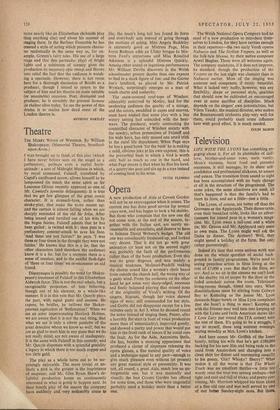Theatre
I WAS brought up to think of this play (which I have never before seen on the stage) as a perfunctory, perhaps even a rueful hark- quinade : a sort of. Midnight Matinee in which, by royal command, Falstaff, transfixed by Cupid's cardboard arrow, allows himself to be lampooned (in much the same spirit as Sir Laurence Olivier recently appeared as one of Mr. Coward's juvenile delinquents). It is true that we get few glimpses of the great comic character. It is stomach-byes, rather than stroke-play, that make the score mount up; and the curtain is almost falling when we arc sharply reminded of the old Sir John. After being teased and terrified out of his wits by the bogus fairies, Falstaff admits that he has been gulled : is twitted with it : then puts in a perfunctory counter-attack to save his face. 'And these are not fairies?' he says. 'I was three or four times in the thought they were not fairies.' He knows that this is a lie, that the other characters (and therefore the audience) know it is a lie; but for a moment there is a sense of reunion, and in the candid flash-light of 'three or four times' we re-encounter an old friend.
Disncyesque is possibly the word for Shakes- peare's treatment of Falstaff in this Elizabethan Aldwych farce. This is not the real whale, but a recognisable projection of him behaving, though out of his element, in a whale-like manner. It is in this vein that Mr. Quayle plays the part, with equal gusto and success. He capers, be bridles, he bellows the Shakes- pearean equivalent of 'Botheration !' When we see an actor impersonating Sherlock Holmes, we are aware that it is not the real thing, that what we see is only a clever pastiche of the great detective whom we know so well; but we arc so glad to meet him in any guise that we do not 'Tali}, mind, are not aware of inadequacy. It is the same with Falstaff in this comedy; and Mr. Quayle dispenses with a splendid geniality a legacy in which there is too much copper and too little gold.
The play as a whole turns out to be sur- prisingly enjoyable. The more trivial or un- likely a plot is, the greater is the importance of suspense; and Mr. Glen Byam Shaw's de- lightful production keeps us continuously interested in what is going to happen next. In their fourth play of the season the company have suddenly and very noticeably come to life; the team's long tail has found its form and everybody acts instead of going through the motions of acting. Miss Angela Baddeley is extremely good as Mistress Page, Miss Joyce Redman adds an Ulster brogue to Mis- tress Ford's attractions and Miss Rosalind Atkinson is a splendid Mistress Quickly. Among other sound or ingenious performances Mr. William Devlin discovers in the Welsh schoolmaster greater depths than one expects to find in a stock figure of fun; and the Garter Inn's landlord, as played by Mr. Patrick Wymark, surprisingly emerges as a man of much charm and authority.
The snow-covered roof-tops of Windsor, admirably contrived by Motley, had for the sweltering audience the quality of a mirage, and the actors, swaddled in capes and scarves, must have wished that some play with a less wintry setting had coincided with the heat- wave. The producer, wisely contrasting the countrified character of Windsor society with the tawdry, urban pretensions of Falstaff and his wide boys, has only missed one small trick in the rural life department. When Page says he has a good hawk 'for the bush' he is making a mild, obvious joke at his own expense; this is the proverbial bush in which a bird is worth only half as much as one in the hand, and what Page means is that when he flies his hawk at a quarry she goes and sits up in a tree instead of coming back to his wrist.
PETER FLEMING


















































 Previous page
Previous page